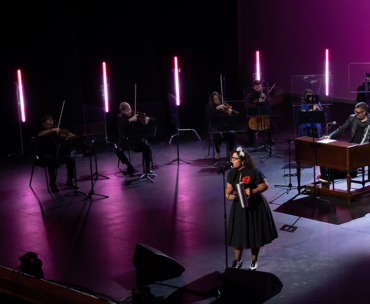
Officials at California State University, Northridge have awarded more than $500,000 in grants to 14 campus projects that promote diversity, equity and inclusion.
Projects that received funding cover all aspects of campus life, from efforts to support students of color applying or transferring to CSUN and peer mentorship programs to the development of live performances and the collection of oral histories.
“There is no doubt that we are at a historic moment in time and in our nation’s history,” said CSUN President Dianne F. Harrison. “CSUN is committed to ensuring that the university is part of the solution to the challenges the nation is facing. Diversity, equity and inclusion are central to CSUN’s mission to enable students to realize their educational goals and to promote their welfare and intellectual progress.
“To that end, we established the Diversity and Equity Innovation Grant to make funding available to support campus projects aimed at increasing the presence and participation of traditionally underserved and underrepresented groups,” Harrison continued. “Those projects receiving funding in this, the grant’s inaugural year, go a long way in assisting the campus in achieving its goal of being a more inclusive and equitable environment for learning, student support, research service and outreach.”
The Diversity and Equity Innovation Grant specifically supports educational projects, scholarly research, creative activities and other programmatic initiatives that promote diversity, equity and inclusion, anti-racism and social justice for the benefit of the CSUN community. Grant recipients were selected by CSUN’s Commission on Diversity and Inclusion, in partnership with the university’s executive leadership, and funded by the Division of Academic Affairs.
“It’s one thing to say that a campus is addressing issues like diversity, equity and inclusion, racism and social justice, but it takes more than words to truly see progress,” said Natalie Mason-Kinsey, CSUN’s chief diversity officer. “We need to have programs that inspire us to move forward, provide support where necessary and spark conversations about who we are and who we hope to be. The proposals that were funded this year do that — whether they are providing support to new and continuing students, supporting pedagogical research or educating us through the arts and oral histories.”
Among the projects that received funding is a targeted recruitment effort by CSUN’s Educational Opportunity Program (EOP) to train peer admissions mentors who will work directly with high school seniors and community colleges students, in particular African-American students, who are applying to the university. The mentors will ensure the high school and community college students know what they need to get into CSUN, and provide those same students support once they are CSUN students.
Another funded project hopes to create a campus learning community to better understand the issues of carcerality — the physical confinement of people to prisons, jails, reservations, mental health institutions, immigration detention centers and urban “ghettos” — and practices of transformative justice.
Grants are also supporting a peer mentoring program for Asian-American students and efforts to centralize, expand and provide greater access to Black Deaf education material, as well as a project in which student researchers and scholars will create mini documentaries that capture indigenous epistemologies as they apply to agricultural production.
Another funded project, “Rap Folklorico Palenque,” has students working with acclaimed radio DJ Anthony Valadez and multimedia artist Sean Hill to develop a live performance that explores the Afro-Colombian history of the Colombia’s autonomous region of San Basilio de Palenque.
Funding is also going to support the collection of more than 60 oral-history interviews with everyday people, entertainers, politicians, sports figures and civil rights and Black power activists to examine the African-American experience in Los Angeles during the 20th century, as well as a multidisciplinary effort to create digital and physical resources that chronicle the histories and achievements of Afro-Latinos.
Other funded projects address ethnic studies education; increasing the number of people of color who get teaching credentials; providing safe spaces to have complex and provocative conversations; making teaching pedagogies more inclusive; and two programs aimed at increasing the number of African-American students on campus.
“Some of the funded projects impact what takes place in the classroom including how we teach, others the community,” said Mason-Kinsey, “But they all invite us to examine who we are, the role we play in society, and how we can help each other to move forward and have serious discussions about the issues of equity, diversity, inclusion, access and social justice.”
For a complete list of funded projects, visit the Commission on Diversity and Inclusion web page.



Comments are closed.